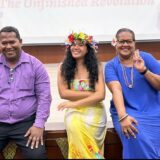Do Legal Professionals in Indonesia Believe Abortion Is A Woman’s Right?
In Indonesia the exact incidence of abortion is difficult to assess. Legal abortion can be provided up to 6 weeks to protect the life of the mother and preserve her physical health, in cases of rape or cases of fetal anomaly. Although abortion is otherwise illegal, analysts say around 2 million Indonesian women each year get an abortion, accounting for around 70-percent of all terminations in South-East Asia.
 WHO in 2008 estimated that 20-60 percent of abortions in Indonesia were induced abortions and half of these were in urban areas. Poor rural women, who predominantly accessed traditional birth attendants and healers (dukun), who used unsafe methods for termination, were found to have a high probability of complications (44%). According to the Indonesian Health Ministry abortions constituted 30 to 50 percent of Indonesia’s total number of maternal deaths.
WHO in 2008 estimated that 20-60 percent of abortions in Indonesia were induced abortions and half of these were in urban areas. Poor rural women, who predominantly accessed traditional birth attendants and healers (dukun), who used unsafe methods for termination, were found to have a high probability of complications (44%). According to the Indonesian Health Ministry abortions constituted 30 to 50 percent of Indonesia’s total number of maternal deaths.
In 2008, ASAP planned a multi-country study that went beyond the community- provider interface and explored the views of gatekeepers such as lawmakers and implementers who are outside the service provision field. The findings from the interviews of 27 legal professionals in Indonesia are presented against the overview of the abortion statistics and the legal context of abortion in the country.
Abortion Trends:
Most of the respondents had no idea about the number of abortions talking place in the country. Of the three who quoted some figures one said 2.5 million the other said one million which the third one said 30%-35% of all medical cases at a clinic. The reasons for seeking abortions were mentioned as economic reasons, lack of knowledge about contraception, spacing, women’s and child health issues, pregnancies out of wedlock, rape, incest, and contraceptive failure. There was a wide range of opinion about the
profile of women who undergo induced abortions. Some respondents talked about induced abortions being common in younger, unmarried and poor women while others had diametrically opposite views. Almost half the respondents said (14/27) that mostly the abortion were unsafe.
Abortion as Women’s Right:
Majority (20/27) agreed that abortion is a women’s rights issue.
One lawyer defined women’s rights as, “Women have rights upon their own body, not only regarding abortion. And they are the ones who have to take the responsibility and bear the consequences of the decisions they make about their own body.”
Abortion as a Public Health or Social Justice Issue:
Half the respondents were aware of the concept of sexual and reproductive rights and almost all were of the opinion that the foetus has rights too. About one fourth, however, felt that the rights of the foetus were relevant only after it becomes viable. The respondents also mentioned that abortion was both a social justice issue and a public health issues.
To quote a judge,”Yes,abortion is social justice issue and public health issue. Puskesmas (public health center) should be provide safe abortion services because these are affordable for the poor and are economically more efficient ways of providing services”
Discussions:
Though illegal, a judicial interpretation in 1970s had permitted medical professionals to conduct abortions in case of exceptional circumstances. This was followed by drafting of a more liberal abortion bill and renewed efforts by a group of NGOs to amend the laws. However, in Indonesia, religion helps shape public opinion on issues such as abortion. Catholics, Muslims, Protestants, Buddhists and Hindus in the country have together protested liberalization of Indonesia’s abortion laws. Islamic and military factions, in particular, went a step further and prohibited the lawmakers from using the word abortion. The word aborsi, used in the Department of Health’s draft was deleted from the 1992 Health Law and was replaced by ‘certain medical procedures’. This ambiguity in the new Health Law of 1992 that does not refer to abortion but mentions prohibition of certain medical procedures has left the doctors confused.

Interestingly, women and providers have found ways to overcome the religious opposition and illegality deemed on abortions under the Criminal Code. The government policies and programmes themselves offer opportunities to circumvent these obstacles. In this study, most lawyers while aware of the abortion issue and its legality aspect, were not familiar with the details of the law and its implementation mechanisms. Abortion laws were not a part of their curriculum and they had few formal sources of credible information.The lack of knowledge was more than made up by the attitude towards abortion. Most respondents believed that abortion is a woman’s rights issue and many also believed that it was a fetal rights issue in case of a viable fetus. Respondents supported expansion of services and quality of care in this context but re-iterated that such moves had to take into account the public and religious leaders’ opinion. This is where they saw the role of NGOs, professional bodies and government – pushing the agenda of women’s health and rights.
Read the complete paper here: http://asap-asia.org/publications/2009/Indonesia_Abortion_Booklet_Update.pdf






